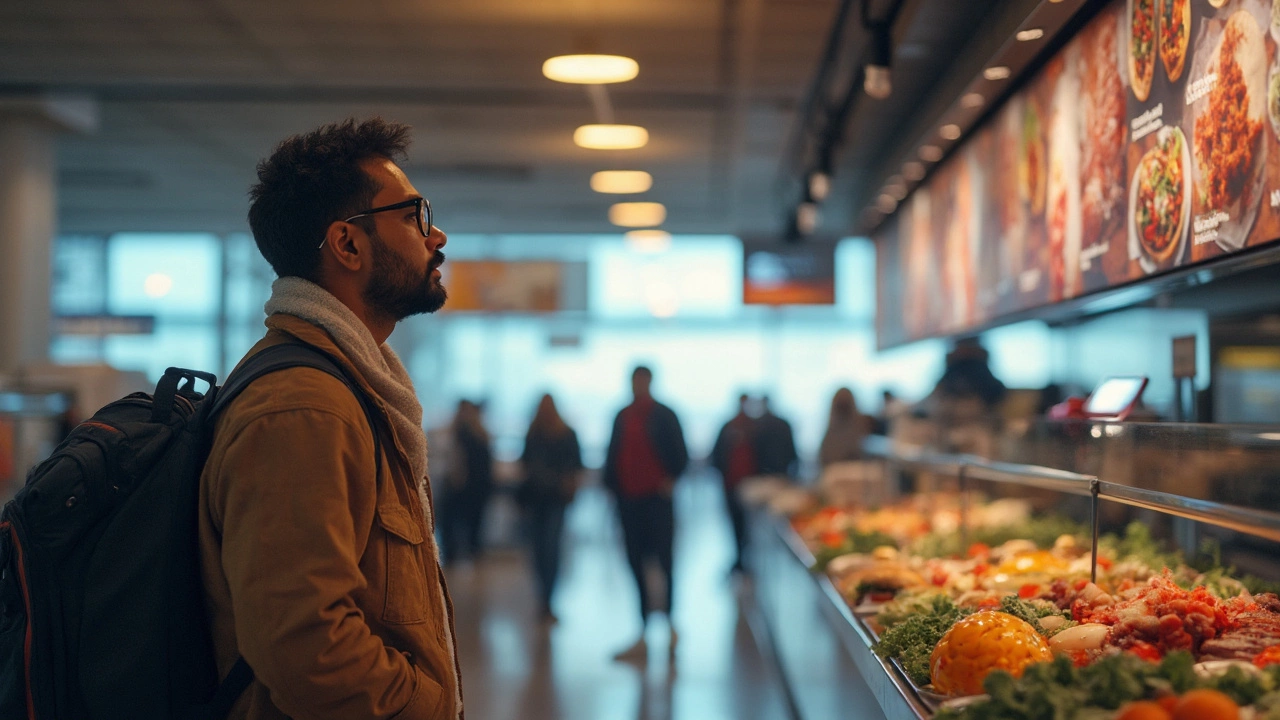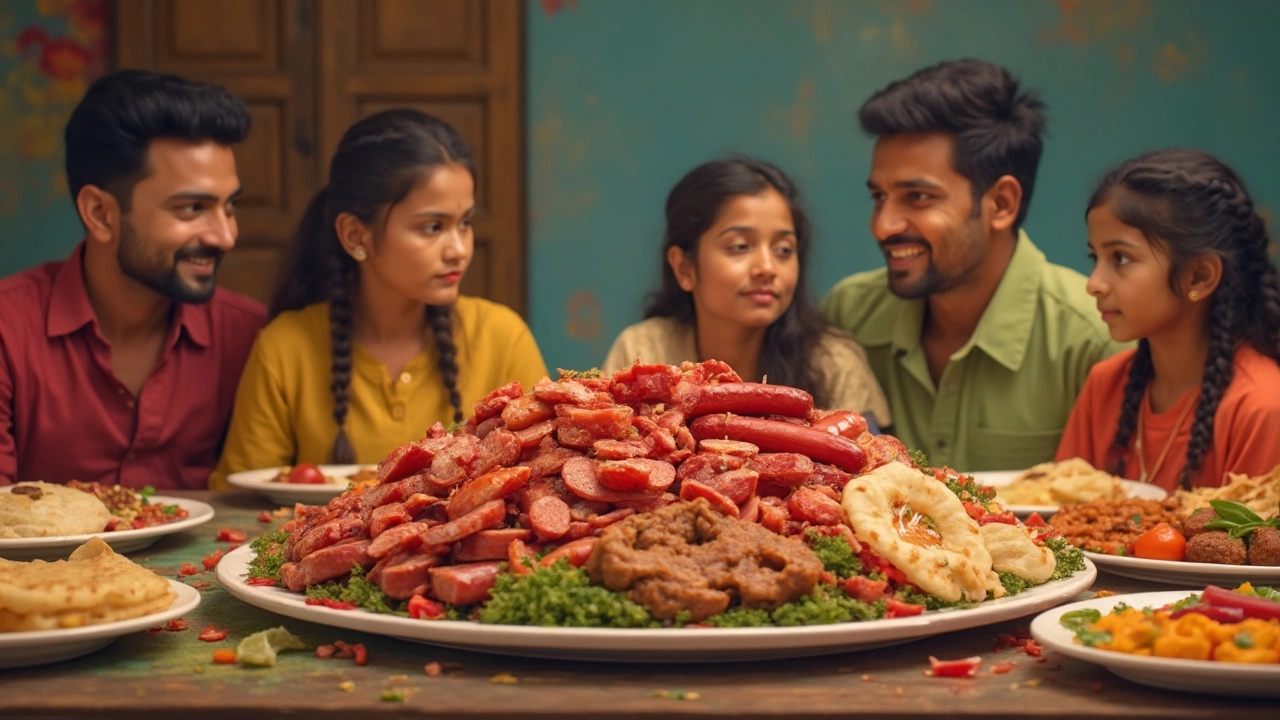Ask any nutrition expert what food tops their 'avoid at all costs' list, and processed meats like bacon, sausages, hot dogs, and deli meats almost always come up first. Most folks know these foods aren’t exactly healthy, but the problem runs way deeper than just the high salt and fat content. Processed meats are basically meat that’s been tinkered with—smoked, cured, salted, or loaded with chemicals to boost flavor and shelf life. The World Health Organization even labeled some of these as carcinogenic, putting them in the same risk category as tobacco.
If you travel for medical care, the food you eat matters even more. Processed meats are global—whether you’re ordering breakfast in Bangkok, grabbing lunch in Frankfurt, or snacking in Chicago, chances are you’ll find these on any menu. But there are tricky names, local food traditions, and menu jargon that can leave you guessing. Getting a handle on what these foods are and why they matter is the first step toward staying healthy, especially when your health is already on the line.
- Processed Meat: The Worst Offender
- Why Processed Meats Are So Harmful
- Global Eating Habits & Cultural Differences
- Risks for Medical Tourists
- How to Spot Processed Meats on the Menu
- Healthier Choices When Traveling
Processed Meat: The Worst Offender
Let’s get real—processed meat dominates the “most unhealthy food” list for a reason. This stuff isn’t just regular meat. It’s meat that's been changed from its natural form by smoking, curing, adding salt, or stuffing it with chemical preservatives. Think hot dogs, bacon, pepperoni, salami, bologna, and those colorful cold cuts in deli counters. For medical tourism, knowing what goes in your food like this is a bigger deal than you might think.
The unhealthy food problem with processed meat isn’t about one thing. It’s a mix: high sodium, added nitrates, extra fat, and a bunch of artificial ingredients. Studies around the world keep linking these meats to higher risks of cancer, especially bowel cancer, as well as heart disease and diabetes.
| Food Type | Sodium (mg per 100g) | Calories | Nitrites/Nitrates |
|---|---|---|---|
| Bacon | 1740 | 541 | High |
| Salami | 1900 | 507 | High |
| Hot Dog | 1100 | 290 | High |
| Turkey Deli Meat | 1050 | 117 | Medium |
Processed meats are everywhere—street food stalls in Thailand, sandwiches in America, breakfasts in British hotels, even platters in fancy Parisian bistros. When you travel for medical treatment, what you eat can seriously affect your recovery. Your body is already working overtime, so stuffing it with ingredients that put extra pressure on your heart and organs doesn't help.
There’s proof, too. The World Health Organization found that eating just 50 grams of processed meat per day (about two strips of bacon) can increase your risk of colorectal cancer by 18%. That’s just two slices—and let’s be honest, most people eat more than that in a typical meal.
- Trickiest part? Labels can hide the truth. You’ll see words like “smoked,” “cured,” or “preserved”—these almost always mean processed.
- Local cuisines may give these foods different names, so double-check unfamiliar menu items before you order.
Travelers often focus on water or produce safety, but ignoring the stuff packed into processed meats is a mistake. One bad meal can set your health back, and nobody wants that—especially if you’re in another country for treatment.
Why Processed Meats Are So Harmful
Let’s not sugarcoat it—processed meats are some of the worst foods you can eat for your health. These are meats that have been preserved by smoking, curing, salting, or adding chemicals like nitrites. The World Health Organization, back in 2015, studied hundreds of research papers and found a strong link between processed meats and serious diseases like cancer and heart problems.
The real trouble comes from additives and how these meats are handled. For example, nitrites and nitrates, which keep meat looking fresh and pink, can turn into cancer-causing chemicals when you eat them. Smoked meats are another problem because the smoking process creates substances that damage your cells. According to Dr. Kurt Straif of the World Health Organization,
“Eating 50 grams of processed meat a day increased the risk of colorectal cancer by 18%.”
Think about that for a second: 50 grams is just two slices of bacon. That’s not a lot. It doesn’t end with cancer, though. Regularly eating processed meats is linked to high blood pressure, heart attacks, and even type 2 diabetes. The salt and saturated fats in these foods put extra strain on your heart and blood vessels.
- Unhealthy food like processed meats can sneak into your diet through seemingly harmless meals—think ham sandwiches, salami pizza, or even beef jerky snacks.
- Every time you heat these meats, especially in microwaves or frying pans, the harmful chemicals can multiply.
- The risk doesn’t seem to disappear if you eat them only once in a while—the more you eat over time, the greater the chance of trouble down the line.
If you’ve got any medical conditions or you’re traveling for surgery or treatment, even moderate amounts of processed meat can make recovery harder or worsen health problems. It’s not about being scared but being aware, especially when you’re away from home and faced with unfamiliar menus. Recognizing what you’re eating—down to the ingredient list—can save you a lot of health headaches both now and later.
Global Eating Habits & Cultural Differences
If you think processed meats are only found in American fast food joints, think again. Eating habits around the world are packed with regional favorites that make processed meat a common pick, even in places you wouldn’t expect. Let’s break down what’s popular—and what you might run into—by region.
- Europe: In Germany and Poland, sausages (wurst and kielbasa) are diet staples. In Italy, cured meats like salami, prosciutto, and mortadella are just as common as pasta. The UK’s breakfast often features bacon and sausages.
- Asia: Don’t think Asia skips out—China is big on lap cheong (Chinese sausage), and Japan’s convenience stores stock bento boxes with ham and smoked meats. Even Korea’s famous budae jjigae (army stew) usually includes spam.
- Middle East: You’ll spot varieties like sujuk (a spicy, dry cured sausage) on many menus. Packed with flavor, but still heavily processed.
- Americas: The US and Canada pile deli meats on sandwiches, love their pepperoni pizza, and can’t imagine a ball game without a hot dog. Latin countries enjoy chorizo and mortadela too.
Here’s how much processed meat people eat on average per year in different countries:
| Country | Processed Meat Consumption (kg/person/year) |
|---|---|
| USA | 23 |
| Germany | 22 |
| UK | 18 |
| Brazil | 13 |
| Japan | 8 |
Why does this matter for medical tourism? Because what’s normal at home might look totally different abroad. Sometimes, a dish that sounds healthy—like a salad—can come smothered with ham or bacon bits in another country. Portion sizes, ingredients, even the idea of what makes a “healthy meal” varies. If you don’t know what to expect, it’s easy to load up on more processed meat than you realize.
Here’s a tip: if you’re traveling for a medical procedure, check out some local menus beforehand and learn the names of local processed meats. Don’t be shy—ask what’s in your food before you order. It isn’t rude; it’s just looking out for your own health.

Risks for Medical Tourists
Traveling for medical treatment is already a stressful process. Mixing in unhealthy food choices, like processed meats, only piles on more risks at a time when your body should be healing. The problem isn’t just about picking up a salty sausage or a sneaky slice of salami—the issue is how processed meats can mess with recovery and even make some health problems worse.
Take infection, for example. After surgery, your immune system is working overtime. Several studies have shown that diets high in processed meats may lead to chronic inflammation, which slows down the body’s healing powers and can even increase the risk of post-op complications. Plus, if you already have heart issues or diabetes (two reasons many people travel for care), eating these meats can spike blood pressure and cholesterol or mess with blood sugar. Not exactly what you want when you’re trying to get better.
Another thing to watch out for is food safety standards. In some countries, rules about meat processing and storage aren’t as strict. This can mean higher chances of foodborne illnesses, which can hit harder if your immune system is already weakened. Even if that sausage tastes familiar, the way it’s made in a new country might not be up to the standards you’re used to.
- If you’re recovering from surgery or illness, processed meats can increase swelling and delay wound healing.
- Cancer patients are often warned to avoid processed foods since these can interact poorly with treatments like chemotherapy.
- Processed meat is often high in sodium and preservatives, which can trigger hypertension, especially dangerous after heart procedures.
It’s not just about avoiding a slice of ham—awareness is key. Ask doctors and hospital staff what’s served, check food labels if you’re shopping for yourself, and don’t hesitate to ask questions at restaurants. Choosing wisely can be the difference between smooth recovery and unexpected setbacks while you're far from home.
How to Spot Processed Meats on the Menu
If you’re eating out in another country, knowing how to spot processed meats can save you from making unhealthy choices without even realizing it. Processed meats show up pretty much everywhere, but they don’t always have obvious names. Sometimes, they hide behind fancy words or get mixed into dishes where you’d least expect them.
Most processed meats are either smoked, salted, cured, or have chemical preservatives added. The big giveaways are names like bacon, ham, pepperoni, salami, chorizo, bologna, hot dogs, frankfurters, corned beef, and most deli meats. In many countries, sausages have different names depending on the region—think bratwurst in Germany, mortadella in Italy, or lap cheong in China. Even something as innocent as a club sandwich or a breakfast buffet might be full of processed meats sliced thin or chopped up as toppings.
Check out these practical ways to skip over processed meat when you’re scanning menus:
- Look for dishes described as "smoked," "cured," "pickled," or "salted"—these are often signs the meat is processed.
- Watch out for "deli," "cold cuts," "charcuterie," or "mixed meat platters"—these usually mean a mix of processed meats.
- If you see a bunch of meats with long shelf lives or vacuum-sealed packaging at a buffet or sandwich counter, it’s almost always processed.
- Ask your server directly about how meats are prepared, especially if it’s not clear on the menu. Most staff are used to questions about food content.
- Be careful with breakfast items—think sausages, “breakfast meats,” or “meat lover’s” options. These often use heavily processed varieties.
- Learn a few key words in the local language related to processed meats before you travel, so you can recognize them faster.
If you’re traveling for medical reasons, it’s smart to keep things as fresh and whole as possible. Grilled chicken, roast beef (that’s sliced fresh), or fish are usually safer bets than anything with “smoked” or “cured” in the name. When in doubt, go simple—fresh meats cooked on the spot, not pulled from a deli case, will almost always be a healthier option.
Healthier Choices When Traveling
Navigating food options on the road isn’t always easy—especially if you’re trying to steer clear of processed meat. But you don’t have to settle for whatever lands on your plate. There are practical ways to make smarter choices while traveling, whether you're at a street stall, hotel buffet, or corner café.
First, fresh is almost always best. When possible, pick dishes cooked from scratch using whole ingredients. Think grilled chicken, fish, tofu, or beans—they pack protein without all the stuff found in processed meats. In many countries, local markets and small restaurants offer grilled or oven-baked options that skip the additives and preservatives.
- Ask for food to be cooked fresh, not pre-made or reheated. This cuts down the odds of hidden salt and chemicals.
- Go heavy on veggies, salads, and whole grains. They’re easy to find in most places and fill you up without all the junk.
- Check ingredient lists if you’re buying packaged snacks. Words like “cured,” “smoked,” or “preserved” mean you're likely looking at processed meat or another high-salt option.
- Try local vegetarian or vegan dishes—even if you’re not fully plant-based. Meals like Indian dal, Mediterranean falafel, or Thai veggie stir-fry are tasty swaps with less risk.
Don’t forget to watch for hidden dangers at breakfast. That buffet bacon and sausage isn’t the only culprit. Even seemingly innocent options like sliced deli meats, hotel omelets, or “breakfast patties” often sneak in processed ingredients. Look for eggs made to order, oats, fruit, yogurt, or local unprocessed cheese instead.
Last tip—don’t be afraid to ask questions. Learn the local food words for processed meats and say them at restaurants or when reading labels. Most places will be happy to help or suggest a better option if you let them know you’re avoiding these foods. A little effort goes a long way in keeping your meals both interesting and safe while you’re out exploring.



